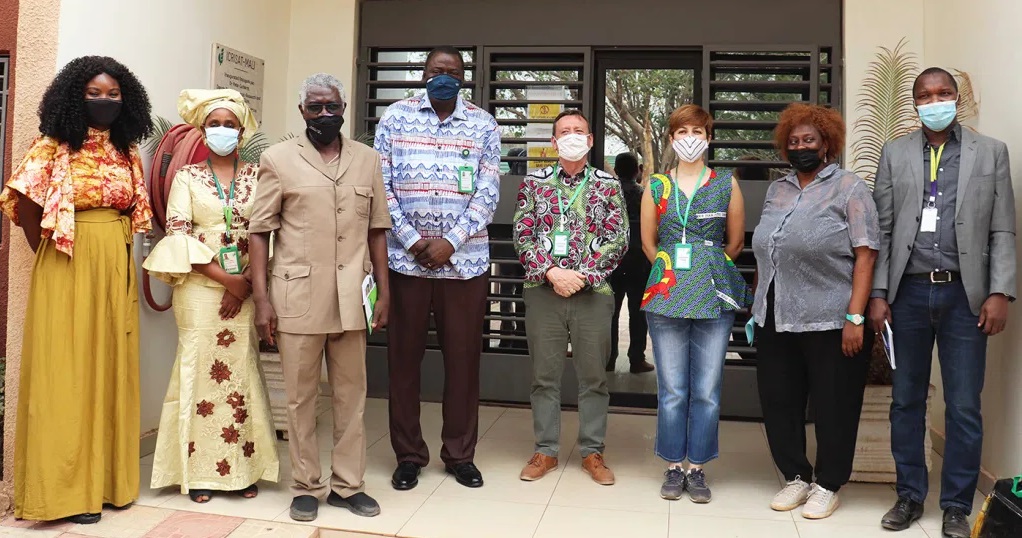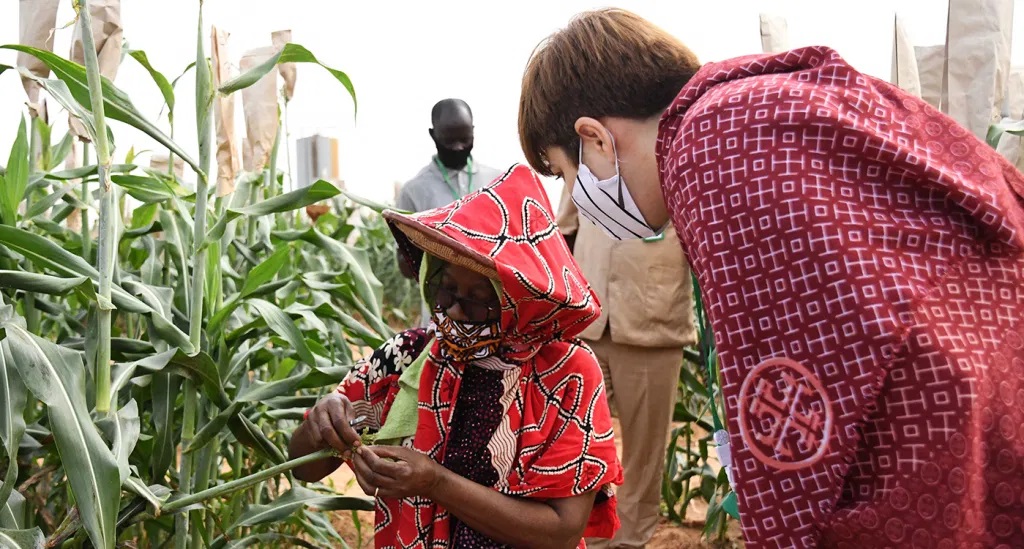Mrs Sabine Togola, Research Technician (L) and Ms Ioana Albulescu, Team Leader-Green Inclusive Growth, EU Delegation to Mali, during a visit to a sorghum field. Photo: N Diakité, ICRISAT
Delegates from the European Commission to Mali expressed interest in exploring new opportunities for collaborations with ICRISAT to improve food and nutrition security sustainably in the most vulnerable target areas of Mali. They discussed the progress made in implementation of the EU-APSAN-Mali project and also referred to ongoing discussions with World Agroforestry (ICRAF) and The World Vegetable Center (WorldVeg) for new projects to strengthen European Union (EU) interventions in the agricultural sector in Mali.
Ms Ioana Albulescu, Team Leader–Green Inclusive Growth, EU Delegation to Mali; and Mr Olivier Lefay, Program Manager, Food Security, EU Delegation to Mali, and focal point of the EU-APSAN-Mali project recently visited ICRISAT’s research station in Samanko, Mali.
Meeting with Dr Ramadjita Tabo, they talked about the evolution of the EU-APSAN-Mali Regional and Research Program Director, West and Central Africa (WCA) project in Kayes, Koulikoro, Ségou and Sikasso regions. They also met the heads of the other centers along with other representatives of World Agroforestry Centre and World Vegetable Center. Mr Lefay reiterated an invitation to
Ms Agathe Diama, Smart Food Coordinator in WCA, to make a presentation on the insights of the Smart Food initiative to the EU during the next partners’ meeting in April. He said that it would create an enabling environment and inform partners about improving nutrition in Mali.
Ms Albulescu and Mr Lefay discussed synergistic actions with other partners and made plans for a subsequent visit to beneficiaries of the projects for directly interacting with them about the contribution of the research centers on their livelihoods. Dr Tabo highlighted the role of research centers in development and scaling interventions in order to create broader impacts.
Dr Baloua Nebie, Sorghum Breeder; Dr Aboubacar Toure, Product Placement Lead; and Dr Hailemichael Desmae, Groundnut Breeder and Regional Breeding Lead; showed them around the sorghum and groundnut off-season nurseries and seed production plots. The delegation was briefed on the challenges in crop production and commercialization in Mali; the ongoing breeding modernization efforts at ICRISAT; and the targeted breeding profiles in West and Central Africa (particularly in Mali). They also visited the greenhouses under renovation with funding from the European Commission through the DeSIRA Program (EU-APSAN-Mali project), and The Gates Foundation through the AVISA project.
The delegation then visited the agroforestry demonstration platform of ICRAF, followed by a visit to demonstration plots of the production and conservation techniques of The World Vegetable Center including a garden, zero-energy cooling shelters, laboratories and so on. Finally, they spent some time at the ICRISAT pathology laboratory and seed stores for sorghum and groundnut.
At the end of the discussions, Ms Albulescu commended the excellent partnership between EU and ICRISAT and all the research centers in Samanko.
The visit was conducted on 8 March 2021.
For more on our work in Mali, click here: http://exploreit.icrisat.org/profile/Mali/346
Reported by Agathe Diama, Head Regional Information and Smart Food Coordinator, ICRISAT-WCA.


